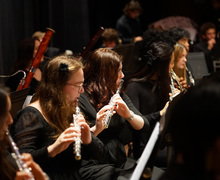Students continue to drive on campus despite spike in gas prices
The national gasoline price average is $3.81 a gallon, but in Syracuse, gas is an average of $4.06 a gallon.
Considering the change in gas prices in Syracuse this past week, prices are currently 37.7 cents per gallon higher than they were exactly one year ago, and 16.8 cents higher than they were one month ago, according to gasoline price website SyracuseGasPrices.com. The national average is 29 cents per gallon higher than it was last year.
But despite rising gas prices and the expense of on-campus parking passes, students are still driving and bringing their cars to school.
The number of parking permits issued to students, faculty and staff has actually decreased in the last year. This year 7,448 permits were issued, said Al Sauer, director of Syracuse University parking and transit services.
“This number is up from 2010; however, it is down about 12,000 total permits from 2011,” Sauer said.
Sauer said he believes the drop in issued permits is due to the increased availability and convenience of on- and off-campus transportation, and has little to do with high gas prices.
The convenience of having a car at school is more of a concern to students than the price of gas or availability of public transportation.
Olivia Farnham, a junior public relations major, said the price of gas does not stop her from driving her car and that having a car on campus makes it easier for her to get around.
“I do think having my car is necessary because it is inconvenient to have to wait to take the bus wherever I need to go,” she said.
Mike Thal, a senior in the Bandier Program for Music and the Entertainment Industries, also said the price of gas didn’t play a role in his decision to bring his car to campus.
“To be fair, the price of gas here is less expensive than it is at home, so it doesn’t really affect me,” said Thal.
But some students only drive their cars a few times a week to off-campus destinations, where the buses may not go or where it may be more convenient to take their car.
“I don’t really have too much time to go places, but I use my car when I need to go places off campus,” said Max Doblin, a sophomore advertising and entrepreneurship and emerging enterprises major.
Sauer said he believes transportation run by the school is available and convenient at any time of day.
“We provide an extensive shuttle service here on our campus and, unless a student has needs to be off of the campus and outside of the mass-transit route, we really feel that our campus is very friendly when it comes to opportunity to transport students,” Sauer said.
But Andrew Filkoff, an architecture major, said he almost never uses these mass-transit systems.
“If I ever have to go somewhere where public transportation is needed, I would just rather take my car,” he said.
In general, Doblin said he’s more concerned with personal access to transportation as opposed to cost of gas or availability to mass-transit routes.
Said Doblin: “It isn’t necessary to have a car on campus, but it is a nice thing to have.”
Published on September 27, 2012 at 12:52 am
Contact Taylor: tblupo@syr.edu





